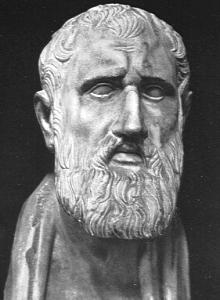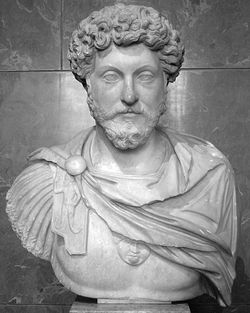Stoicism
2007 Schools Wikipedia Selection. Related subjects: Philosophy
'Stoicism is a school of philosophy, the founding of which is associated Zeno of Citium, which became the foremost popular philosophy among the educated elite in the Greco-Roman Empire, to the point where, in the words of Gilbert Murray, "nearly all the successors of Alexander [...] professed themselves Stoics." It teaches that self-control, fortitude and detachment from distracting emotions, sometimes interpreted as an indifference to pleasure or pain, allows one to become a clear thinker, level-headed and unbiased. A primary aspect of Stoicism would be described as improving the individual’s spiritual well-being.
Virtue, reason, and natural law are prime directives. By mastering passions and emotions, stoics believe it is possible to overcome the discord of the outside world and find peace within oneself. Stoicism holds that passion distorts truth, and that the pursuit of truth is virtuous. Greek philosophers such as Cleanthes, Chrysippus, and later Roman thinkers such as Cicero, Seneca the Younger, Marcus Aurelius, Cato the Younger, Dio Chrysostom, and Epictetus are associated with Stoicism. In Cicero's case, it should be emphasised that while he shared many of the moral tenets of Stoicism, he was not a Stoic himself but an eclectic. Stoic philosophy is usually contrasted with Epicureanism.
History
Stoicism first appeared in Athens in the Hellenistic period around 301 BC and was introduced by Zeno of Citium. He taught in the famous stoa poikile (the painted porch) from which his philosophy got its name. Central to his teachings was the law of morality being the same as nature. During its initial phase, Stoicism was generally seen as a back-to-nature movement critical of superstitions and taboos. The philosophical detachment also encompassed pain and misfortune, good or bad experiences, as well as life or death. Zeno often challenged prohibitions, traditions and customs. Another tenet was the emphasis placed on love for all other beings.
His ideas developed from those of the Cynics, whose founding father, Antisthenes, had been a disciple of Socrates. Zeno's most influential follower was Chrysippus, who was responsible for the molding of what we now call Stoicism.
The Stoics provided a unified account of the world, consisting of formal logic, materialistic physics and naturalistic ethics. Of these, they emphasized ethics as the main focus of human knowledge, though their logical theories were to be of more interest for many later philosophers. Later Roman Stoics focused on promoting a life in harmony within the universe, over which one has no direct control. Modern philosophy, contrary to original stoicism, often associates stoicism with determinism, as opposed to the Arminian doctrine of free will.
Stoic ethics and virtues
The ancient Stoics are often misunderstood because the terms they used pertained to different concepts in the past than they do presently. The word stoic has come to mean unemotional or indifferent to pain, because Stoic ethics taught freedom from passion by following reason. But the Stoics did not seek to extinguish emotions, only to avoid emotional troubles by developing clear judgment and inner calm through diligent practice of logic, reflection, and concentration.
Borrowing from the Cynics, the foundation of Stoic ethics is that good lies in the state of the soul itself; in wisdom and self-control. Stoic ethics stressed the rule: "Follow where reason leads." One must therefore strive to be free of the passions, bearing in mind that the ancient meaning of passion was "anguish" or "suffering" —somewhat different to the modern use of the word. A distinction was made between pathos (plural patheia) which is normally translated as "passion", propathos or instinctive reaction (e.g. turning pale and trembling when confronted by physical danger) and eupathos, which is the mark of the Stoic sage (sophos). The eupatheia are feelings resulting from correct judgment in the same way as the passions result from incorrect judgment.
The idea was to be free of suffering (which the Stoics called passion) through apatheia (απαθεια) (Greek) or apathy, where apathy was understood in the ancient sense—being objective or having "clear judgment"—rather than simple indifference, as apathy implies today. The Stoic concepts of passion and apatheia are analogous to the Buddhist noble truths; All life has suffering ( Dukkha), suffering is rooted in passion and desire ( Samudaya), meditation and virtue can free one from suffering ( Nirodha and Marga). It is also analogous to the concepts in Bhagavad Gita, a Hindu scripture, which stresses rising above the dualities such as pleasure-pain, win-lose, to perform one's duties.
For the Stoics reason meant not only using logic, but also understanding the processes of nature—the logos, or universal reason, inherent in all things. Living according to reason and virtue, they held, is to live in harmony with the divine order of the universe, in recognition of the common reason and essential value of all people. The four cardinal virtues of the Stoic philosophy are wisdom (Sophia), courage (Andreia), justice (Dikaiosyne), and temperance (Sophrosyne), a classification derived from the teachings of Plato.
Following Socrates, the Stoics held that unhappiness and evil are the results of ignorance. If someone is unkind, it is because they are unaware of their own universal reason. Likewise, if they are unhappy, it is because they have forgotten how nature actually functions. The solution to evil and unhappiness then, is the practice of stoic philosophy—to examine one's own judgements and behaviour and determine where they have diverged from the universal reason of nature.
Spiritual exercise
Philosophy for a Stoic is not just a set of beliefs or ethical claims, it is a way of life involving constant practice and training (or askesis, see ascetic). Stoic philosophical and spiritual practices included logic, Socratic dialogue and self-dialogue, contemplation of death, training attention to remain in the present moment (similar to some forms of Eastern meditation), daily reflection on everyday problems & possible solutions, and so on. Philosophy for a Stoic is an active process of constant practice and self-reminder.
In Meditations, Marcus Aurelius defines several such practices. For example, in Book II, part 1:
- "Say to yourself in the early morning: I shall meet today ungrateful, violent, treacherous, envious, uncharitable men. All of these things have come upon them through ignorance of real good and ill... I can neither be harmed by any of them, for no man will involve me in wrong, nor can I be angry with my kinsman or hate him; for we have come into the world to work together..."
Brotherhood
A distinctive feature of Stoicism is its cosmopolitanism. All people are manifestations of the one universal spirit and should, according to the Stoics, live in brotherly love and readily help one another. They held that external differences such as rank and wealth are of no importance in social relationships. Thus, before the rise of Christianity, Stoics recognized and advocated the brotherhood of humanity and the natural equality of all human beings. Stoicism became the most influential school of the Graeco–Roman world, and produced a number of remarkable writers and personalities, such as Cato the Younger and Epictetus.
In particular, they were noted for their urging of clemency toward slaves. Seneca exhorted, "Kindly remember that he whom you call your slave sprang from the same stock, is smiled upon by the same skies, and on equal terms with yourself breathes, lives, and dies."
Stoicism's influence on Christianity
Although Stoicism was considered by many early Fathers of the Church to be a part of the philosophical decline of the ancient world, many of its elements were held in high esteem, in particular, the natural law, which is a major part of the Roman Catholic and early American doctrines of secular public morality. The central Stoic idea of logos strongly influenced Christian theology, in particular, identifying Christ with the logos (see John 1). The Stoic definition of virtue as the conformance of the will to the rational order of the world has parallels with traditional Christian morality. The Stoic cosmopolitanism influenced Augustine of Hippo's concept of the City of God. Stoicism influenced the Christian Boethius in his Consolation of Philosophy, a book which promotes Christian morality via secular philosophy; this book was highly influential in the Middle Ages.
Modern Usage
The word "stoic" now commonly refers to someone indifferent to pain, pleasure, grief, or joy. The modern usage as "person who represses feelings or endures patiently" is first cited in 1579 as a noun, and 1596 as an adjective. In contrast to the term " epicurean", the Stanford Encyclopedia of Philosophy's entry on Stoicism notes, "the sense of the English adjective ‘stoical’ is not utterly misleading with regard to its philosophical origins."
Quotations
Collection of various Stoic quotes:
Epictetus:
- "First, decide who you would be. Then, do what you must do."
- "When I see a man in a state of anxiety, I say, What can this man want? If he did not want something which is not in his power, how could he still be anxious?"
- "Freedom is secured not by the fulfilling of one's desires, but by the removal of desire."
- "Nothing outside the will can hinder or harm the will; it can only harm itself. If then we accept this, and, when things go amiss, are inclined to blame ourselves, remembering that judgment alone can disturb our peace and constancy, I swear to you by all the gods that we have made progress."
- "If you would not fail of what you seek, or incur what you shun, desire nothing that belongs to others; shun nothing that lies beyond your own control; otherwise you must necessarily be disappointed in what you seek, and incur what you shun."
- "In a word, neither death, nor exile, nor pain, nor anything of this kind, is the real cause of our doing or not doing any action, but our opinions and the decisions of our will."
- "Where is the good? In the will. Where is the evil? In the will. Where is neither of them? In those things which are independent of the will."
- "Who then is the invincible? It is he whom none of the things disturb which are independent of the will."
- "Man is disturbed not by things, but by the views he takes of them."
- "No man is free who is not master of himself."
- "Wherever I go it will be well with me, for it was well with me here, not on account of the place, but of my judgments which I shall carry away with me, for no one can deprive me of these; on the contrary, they alone are my property, and cannot be taken away, and to possess them suffices me wherever I am or whatever I do."
- "I am formed by nature for my own good: I am not formed for my own evil."
- "If, therefore, any be unhappy, let him remember that he is unhappy by reason of himself alone."
- "Every person must deal with each thing according to the opinion that he holds about it."
- "Permit nothing to cleave to you that is not your own; nothing to grow to you that may give you agony when it is torn away."
- "He is a wise man who does not grieve for the things which he has not, but rejoices for those which he has."
- "God is best worshiped in the shrine of the heart by the desire to know and obey him."
Marcus Aurelius:
- "It loved to happen."
- "The universe is in change, life is an opinion."
- "Get rid of the judgment ... get rid of the 'I am hurt,' you are rid of the hurt itself."
- "The mind in itself wants nothing, unless it creates a want for itself; therefore it is both free from perturbation and unimpeded, if it does not perturb and impede itself."
- "Everything is right for me, which is right for you, O Universe. Nothing for me is too early or too late, which comes in due time for you. Everything is fruit to me which your seasons bring, O Nature. From you are all things, in you are all things, to you all things return."
- "Let there be freedom from perturbation with respect to the things which come from external causes, and in actions whose cause lies in yourself, be just; that is, let impulse and action terminate in social acts, for this is according to your nature."
- "If you are distressed by any external thing, it is not this thing which disturbs you, but your own judgment about it. And it is in your power to wipe out that judgment now."
- "Nothing happens to any man which he is not formed by nature to bear."
- "It is in our power to refrain from any opinion about things and not to be disturbed in our souls; for things in themselves have no natural power to force our judgments."
- "If you work at that which is before you, following right reason seriously, vigorously, calmly, without allowing anything else to distract you, but keeping your divine part pure, as if you were bound to give it back immediately; if you hold to this, expecting nothing, but satisfied to live now according to nature, speaking heroic truth in every word which you utter, you will live happy. And there is no man able to prevent this."
- "Everywhere and at all times it is in your power to accept reverently your present condition, to behave justly to those about you, and to exert your skill to control your thoughts, that nothing shall steal into them without being well examined."
- "How ridiculous and how strange to be surprised at anything which happens in life!"
- "Outward things cannot touch the soul, not in the least degree; nor have they admission to the soul, nor can they turn or move the soul; but the soul turns and moves itself alone."
- “Even when the mind is feeling its way cautiously and working its way round a problem from every angle, it is still moving directly onwards and making for its goal.”
- "If you are distressed by anything external, the pain is not due to the thing itself but your own estimate of it; and this you have the power to revoke at any moment"
Seneca:
- "The point is, not how long you live, but how nobly you live."
- "That which Fortune has not given, she cannot take away."
- "Let Nature deal with matter, which is her own, as she pleases; let us be cheerful and brave in the face of everything, reflecting that it is nothing of our own that perishes."
- "The soul should know whither it is going and whence it came, what is good for it and what is evil, what it seeks and what it avoids, and what is that Reason which distinguishes between the desirable and the undesirable, and thereby tames the madness of our desires and calms the violence of our fears."
- "Virtue is nothing else than right reason."
Books
Primary Sources
- A. A. Long and D. N. Sedley, The Hellenistic Philosophers (Cambridge: Cambridge University Press, 1987)
- Brennan T. Brittain C. Epictetus, Discourses and Other Writings, Cambridge University Press, April 2004.
- Harvard University Press Epictetus Discourses Books 1 and 2, Loeb Classical Library Nr. 131, June 1925.
- Harvard University Press Epictetus Discourses Books 3 and 4, Loeb Classical Library Nr. 218, June 1928.
- Gill C. Epictetus, The Discourses, Everyman 1995.
- Long George Enchiridion by Epictetus, Prometheus Books, Reprint Edition, January 1955.
- Long George Discourses of Epictetus, Kessinger Publishing, January 2004.
- Moses Hadas (ed.), Essential Works of Stoicism (1961: Bantam)
- Lucius Annaeus Seneca the Younger (transl. Robin Campbell), Letters from a Stoic: Epistulae Morales Ad Lucilium (2004) ISBN 0-14-044210-3
- Marcus Aurelius Antoninus, Meditations, translated by Maxwell Staniforth; ISBN 0-14-044140-9, or translated by Gregory Hays; ISBN 0-679-64260-9.
- Oates Whitney Jenning The Stoic and Epicurean philosophers, The Complete Extant Writings of Erpicurus, Epictetus, Lucretius and Marcus Aurelius, Random House, 9th printing 1940.
Studies
- John Sellars, Stoicism (Berkeley: University of California Press, 2006)
- Brad Inwood, ed., The Cambridge Companion to The Stoics (Cambridge: Cambridge University Press, 2003)
- Bakalis Nikolaos, Handbook of Greek Philosophy: From Thales to the Stoics Analysis and Fragments, Trafford Publishing, May 2005, ISBN 1-4120-4843-5
- A. A. Long, Stoic Studies (Cambridge University Press, 1996; repr. University of California Press, 2001)
- Pierre Hadot, Philosophy as a Way of Life: Spiritual Exercises from Socrates to Foucault, Blackwell, 1995, ISBN 0-631-18033-8
- Steven Strange (ed.), Stoicism: Traditions and Transformations (2004) ISBN 0-521-82709-4
- Lawrence C. Becker, A New Stoicism 1998 ISBN 0-691-01660-7
- Vlassis G. Rassias, "Theois Syzen. Eisagoge ston Stoicismo", Athens, 2001, ISBN 960-7748-25-5


